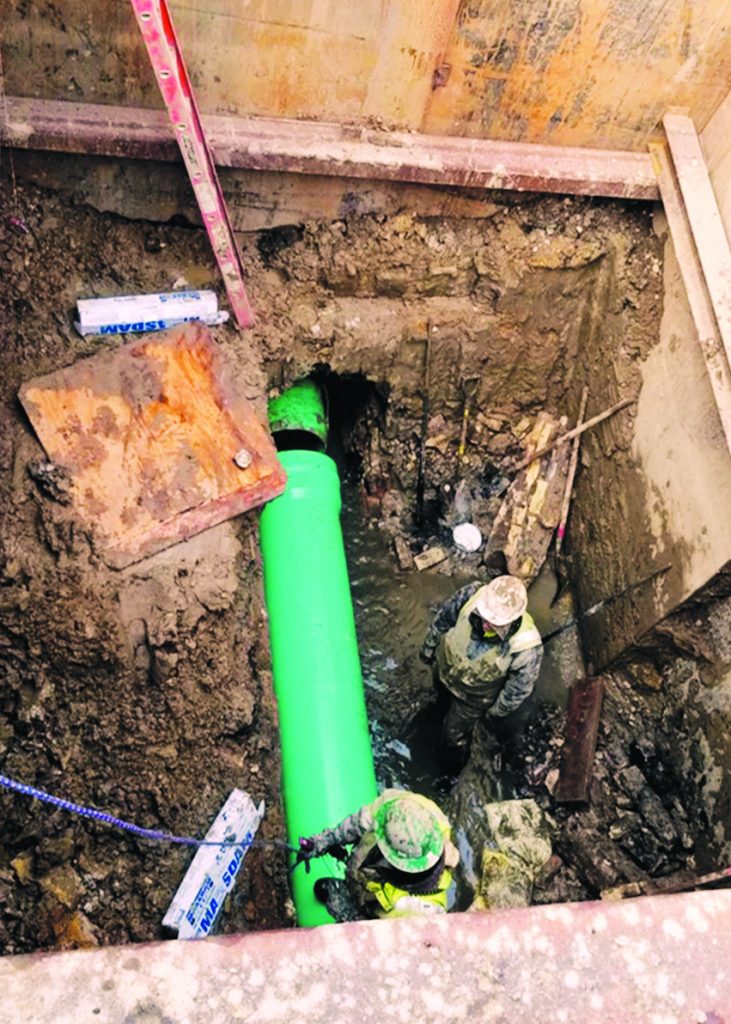
Construction workers shore up an old brick sewer on Main Avenue after its collapse in October. The PVC pipe was needed to replace bricks that had collapsed. (Photo/City Engineering Department)
Nancy Edmonds Hanson
hansonnanc@gmail.com
Below your feet in downtown Moorhead lies a reminder of the Great London Stink of 1858. That’s when a British engineer devised an underground sewer system with waterways made of brick – the same technique used here 70 years ago to build key downtown wastewater pipes that are still in use today.
But time has caught up with the system, City Engineer Bob Zimmerman told the Moorhead City Council Monday … and the time has come to shore up the system before major problems occur.
The brick lines handle about half of the city’s wastewater, he said, shuttling it to the Wastewater Treatment Plant near Highways 75 and 10. Seven thousand feet of the triple-layer brick lines underlie downtown and connect with southside pipes. “They’re at the end of their useful life,” he noted, pointing out developing problems and a catastrophic failure at Eighth and Main last summer that required extensive excavation and traffic disruption.
Instead of digging out and replacing the 40-by-60-inch lines – causing extensive obstacles for drivers – the engineering department plans to install a trenchless lining that is cured in place. It requires excavation only at manholes. The total estimated cost is $13 million, with work to be scheduled over four years.
That’s the largest item on the wastewater treatment agenda for 2019. He detailed four smaller projects:
· Two new headworks screens to strain large solid waste as the water enters the treatment system;
· A new 60-foot cover for the anaerobic digester that turns endstage waste into methane, then used to both power the digester and heat the Wastewater Treatment Plant;
· A storage facility for emergency generators and other equipment formerly stockpiled in a now-demolished building near the Cullen Hockey Arena;
· And a replacement for Sanitary Lift Station #14 in the Regal Park Estates area, which serves one-third of the city.
All five projects deemed the system’s most urgent come to about $19 million. Zimmerman sketched out several options. The most likely funding option, he told the council, is applying to Minnesota’s Water Pollution Control Revolving Fund, which underwrites projects that can’t be funded out of city reserves. The below-market-rate loan would be repaid through revenue from a small increase in service charges.
The council adopted the plan by unanimous vote. That’s important because the resolution is needed before submitting it to the state for placement on MPCA’s priority project list. If Moorhead’s application makes the final cut, based on funds available, work could begin in mid-2019.
Zimmerman noted that unlike the city of Fargo, which funds these projects with special assessments, Moorhead has traditionally paid for upgrades through service fees paid by city residents. Council member Sara Watson Curry observed that the increase in fees – from $1 to $2 per month for the average user, according to his projections – would cost an average homeowner only a small fraction over the repayment period as the projected $1,400 special assessment that would be otherwise be required to fund a project of this scope.
Facilities manager Paul Fiechtner presented the results of another study of the city’s assets – a review of all buildings conducted in December 2016. Color-coded by the urgency of the issue, he noted extensive use of the color red, including the current status of City Hall, most of the neighborhood recreational centers, the fire stations, both golf course clubhouses, the library and the Hjemkomst Center. To repair all of the red issues identified in the study – the majority involving electrical, HVAC and fire protection issues – would come to nearly $8 million before eliminating the Moorhead Sports Center, which will be sold to the school district for $1 in July, and the former site of Usher’s House, which was recently sold.
Instead, he shared a list of 15 deemed the most critical, most involving the safety of the staff and public or related to their ability to deliver services. The pared-down list for attention in 2019 comes to $700,000. Fiechtner said the Public Works Department is planning to create a task force later this year to develop a 20-year plan to guide future decisions.
The council also reappointed five citizens to new terms on commissions and boards on which they currently serve, including Airport Committee – Walter Vollmers; Board of Appeals and Equalization – Bruce Huotari; Economic Development Authority – Michael Burns; Human Rights Commission – Cani Adan; and Public Service Commission – Kristine Thompson.


